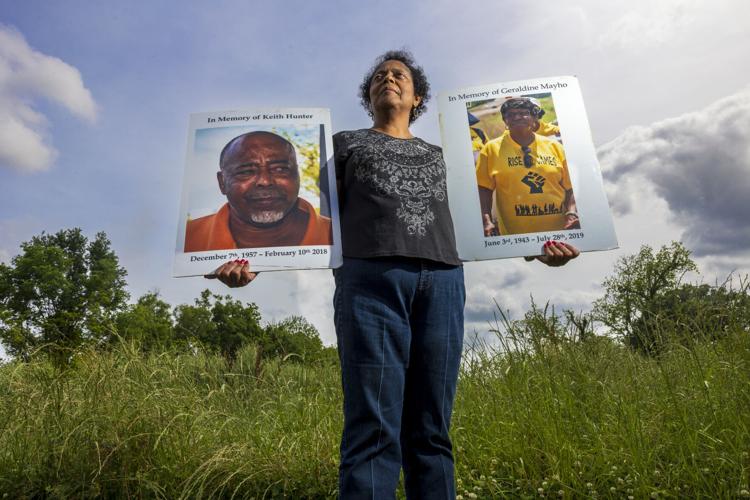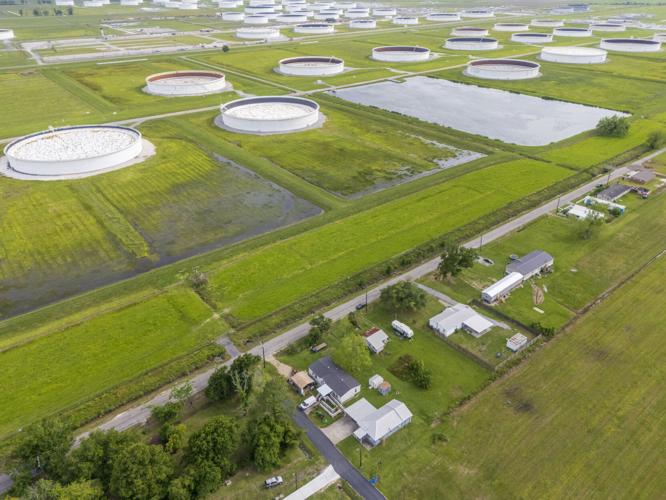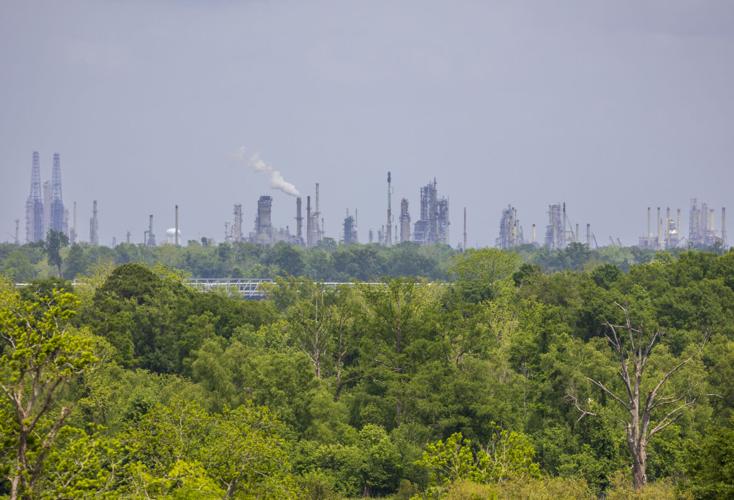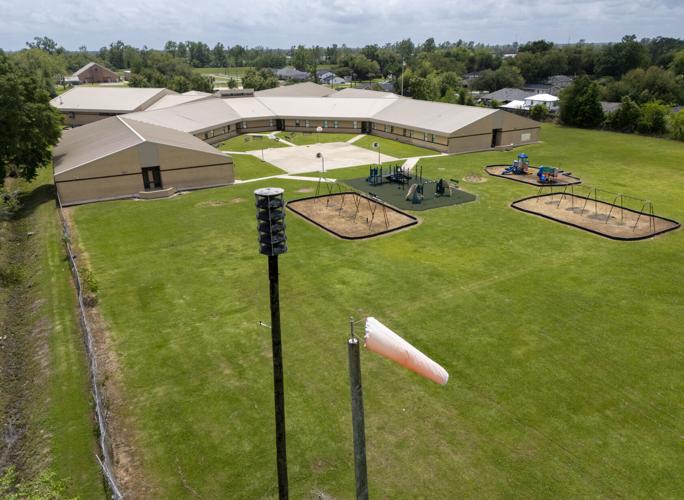As she sat on her porch across from the Mississippi River, Sharon Lavigne reflected on what had happened — the change she had long hoped to see.
She had gone from her home in St. James Parish to Washington, D.C. for an April 9 announcement that amounted to the federal government’s biggest move in years to reduce industrial pollutants likely to cause cancer.
The parish where Lavigne, 71, has spent her life is on the front lines, part of the heavily industrialized stretch along the river activists have long labeled “Cancer Alley.” A proposed Formosa plastics plant down the road from Lavigne’s home would produce one of the chemicals targeted by the new rule.
“It will save our lives,” she said of the new rule. Of Michael Regan, administrator of the U.S. Environmental Protection Agency, she said: “He’s the only one that came down here to see about us. He heard our cry.”

Sharon Lavigne retrieves protest signs from her car at her home in St. James Parish on Tuesday, April 16, 2024. (Photo by Chris Granger, The Times-Picayune)
The new rule delivered on Regan’s promise — in two visits to Louisiana since President Joe Biden appointed him in 2021 — to take action. Lavigne and other community activists praise Regan, but Republican government officials in the state as well as industry backers are castigating the announcement as one that will kill jobs and disrupt the production of needed chemicals.
Regan, the first Black man to head the EPA, has put a major focus on environmental justice, making it a point to meet with community leaders here and highlighting those discussions when announcing the new rule.
Louisiana has the nation’s fourth-highest concentration of releases of toxic chemicals that could threaten health and the environment, according to federal data from 2022. Nearly two-thirds of the facilities covered by the new rule are in Louisiana and Texas, the EPA says.
Most of Louisiana’s petrochemical plants are concentrated along the river between New Orleans and Baton Rouge, or in Calcasieu Parish in southwest Louisiana.

Chemical plants fill the region between Baton Rouge and New Orleans, dubbed ‘Cancer Alley.’
Studies have pointed to disproportionate risks of cancer and other health problems in such areas, which are often low-income and Black. The petrochemical industry disputes those studies, pointing to numbers from the state’s tumor registry and what it says is the government’s flawed science.
For Regan and other proponents of the change, the new rule is long overdue. The EPA says it will reduce by 96% the number of people with increased cancer risks related to air toxics in communities within 6 miles of large plants.
The Denka Performance Elastomers plant in St. John the Baptist Parish, downriver from St. James, is under particular scrutiny as the nation’s largest emitter of chloroprene. The chemical, which the EPA considers likely cancer-causing, is used to make neoprene.
A 2014 report from the EPA said five census tracts near the plant had the country's highest risk of cancer because of exposure to airborne emissions.
The company calls the agency’s science classifying chloroprene as “likely carcinogenic” flawed and says it will pursue legal action against the rule. It also argues that, under the rule, it will be forced to idle operations at the facility, which employs 250.
It says it has already substantially reduced emissions at the site, which it adds is the only source of neoprene within the United States.
Louisiana Attorney General Liz Murrill has harshly criticized the new rule as well, but has not yet decided on legal action. Murrill’s ally and former boss, Gov. Jeff Landry, repeatedly sued the Biden administration over environmental regulations as attorney general.
“EPA’s assault is irrational, irresponsible, arbitrary and entirely political,” Murrill said in a written response to questions, noting neoprene is “used to make automobile parts, hoses, belts, electric wires and cables, coated fabrics, rubber gloves, wetsuits and more.”
“The rule is impossible to comply with – it is intended to force a shutdown of the Denka facility, which is ultimately dangerous and harmful to the community,” she said of the economic impact and the potential disruption in manufacturing neoprene.
‘Lives are more important’
The Denka facility’s tanks and pipes rise in the distance behind a cow pasture along the river, situated on the edge of Reserve and LaPlace. The EPA has repeatedly noted the Fifth Ward Elementary School, attended by more than 300 children, is nearby.

A DEQ air quality measuring vehicle in the front yard of Milton Cayette, right, in St. James Parish on Tuesday, April 16, 2024. (Photo by Chris Granger, The Times-Picayune)
Michael Cambre, 75, lives close to the plant in a spacious house with oak trees along the side of his yard facing the facility.
He worked his entire adult life in refineries, so he’s familiar with industrial plants. He believes the refineries he worked for provide “a great living,” but he stresses they should be operated with a high standard of safety.
Cambre would not want to see the jobs plants like Denka provide disappear, but the operators, he said, “need to be held accountable” when it comes to safety.
“For people that work there and people in the parish,” he said as he discussed the plant in his kitchen. “And we should never back off from making them live up to that expectation.”
Down the street, some residents took a harder line against the plant. Henry Hart, 64, worked for the parish for more than three decades, but also spent a few years as a contractor at the facility, formerly owned by Dupont.
He called the new rule too late and scoffed at the idea that the jobs the plant provides should be a factor.
“People’s lives are more important than a job,” Hart said as he washed his car outside his house. “You can get a job anywhere.”

Cattle graze in a field next to the Denka Performance Elastomer chemical plant in Reserve on Tuesday, April 16, 2024. (Photo by Chris Granger, The Times-Picayune)
The new rule will apply to about 200 plants, with the specific goal of lowering cancer risks. It puts a special focus on chloroprene and ethylene oxide, both of which have been linked to cancer. The EPA says the rule will reduce emissions from both chemicals by 80% at affected facilities.
It also reduces the compliance period for Denka to 90 days instead of two years, though the company may request an extension. A chloroprene standard of 0.3 micrograms per cubic meter will be in place; the company reported just over twice that level in January.
Denka called the reduction in compliance time “unprecedented and unfeasible.”
“EPA’s final rule mandates an elaborate set of capital improvements that require careful planning and implementation for the safety of our workers and the community,” the company said. “EPA is well aware that no chemical plant could comply with the requirements of the final rule within 90 days.”
The Louisiana Chemical Association, which represents plants in the state, alleges the rule will badly harm the production of chemicals used to manufacture material for industries like health care and agriculture.
It contests findings of elevated risks of cancer and other health problems near plants, pointing to Louisiana’s tumor registry, which collects cancer data statewide, to make its case. Advocates say the registry is a flawed tool to determine the risks and point to other findings showing, for example, elevated cancer risks and health issues with babies.
‘A whole lot of money’
Lavigne formed her organization, Rise St. James, in 2018 and she has since gained attention far beyond the parish where she grew up due to her advocacy.
She has received a string of accolades, including the Goldman Environmental Prize, and was in recent days named one of Time’s 100 most influential people for 2024. Not only was she invited to the EPA announcement in Washington this month, she was asked to give a short speech, she said.

Sharon Lavigne at home in St. James Parish on Tuesday, April 16, 2024. (Photo by Chris Granger, The Times-Picayune)
Lavigne taught special education at St. James High School for 38 years. The school has moved and the campus where she taught for almost her entire career is now the site of a Koch methanol plant.
She says there are 12 facilities within a 10-mile radius in the area, and the feeling among residents that nothing could be done to stop more from moving in spurred her activism. Rise St. James has since received support from outside organizations, including a Michael Bloomberg-backed campaign.
On the short drive over to the the proposed Formosa facility, ammonia and styrene plants in the distance, she points out the fenced-off area on the property that may have been a cemetery where slaves were buried.
Asked about arguments that the plants are providing jobs, Lavigne counters: At what cost?
“You are providing jobs, but you're also providing sickness and death,” she said. “It's not worth us giving up our lives for them to make a whole lot of money.”
Staff writer Mark Schleifstein contributed to this report.




















































